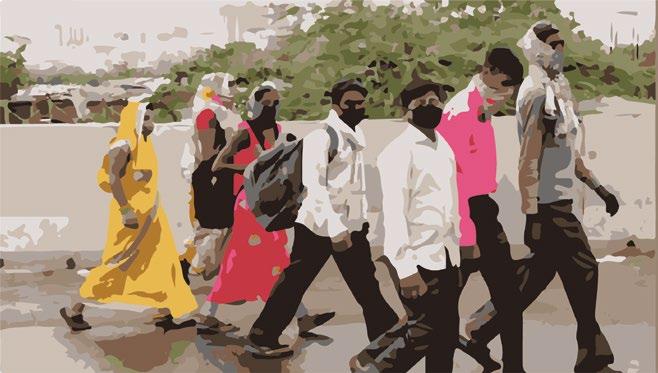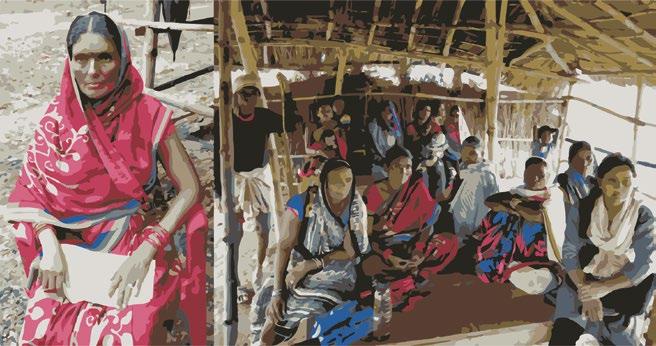
5 minute read
Sanitation Workers
Image: Creative Commons
Sanitation workers: At the bottom of the Rights Pyramid
The World Health Organization (WHO) defines ‘sanitation work’ as work that includes emptying toilets, pits and septic tanks; entering manholes and sewers to fix or unblock them; transporting fecal waste; working treatment plants; as well as cleaning public toilets or defecation around homes and businesses.1
In India the sanitation workforce mainly comprises Dalits or people belonging to the castes dubbed ‘untouchable’ in complete contravention of the law. The still prevalent stringent caste system leads to further social stigmatization of sanitation workers. This stigma compounds their social ostracism and limitations on social mobility. This also often results in intergenerational discrimination, where children of sanitation workers often struggle to escape the vicious cycle of limited opportunities and sanitation work.3
It is estimated that one manhole worker dies unblocking sewers by hand every five days in India (BBC 2018).4 But this number may easily be larger because the many unreported deaths. Further, an approximate five million people in India are engaged in sanitation work, of which two million are likely to be engaged in ‘high-risk’ work such as cleaning sewers and septic tanks.5
The COVID-19 pandemic led to the emergence of a few invisible heroes including sanitation workers whose efforts although recognized are not honored adequately. The ones cleaning COVID wards or quarantine centres, those picking up garbage from houses where
COVID patients are self-quarantining, or the ones cleaning surfaces that COVID affected people may have touched, are exposed to high risk of contracting the disease. Bangalore, New Delhi, Mumbai have recorded several deaths of sanitation workers due to COVID.6
Legal safeguards
In India, the Prohibition of Employment as Manual Scavengers and their Rehabilitation Act, 2013 provides for rehabilitation of manual scavengers and provides for strict prohibition on the practice of manual scavenging and dry latrines. There is also a National Commission for Safai Karamcharis which gives suggestions to the government and takes suo moto action on incidents affecting sanitation workers. The government has also established National Safai Karamcharis Finance & Development Corporation in 1997 which aims to uplift sanitation workers by making available loan and non-loan schemes to them. The Employment of Manual Scavengers and Construction of Dry Latrines (Prohibition) Act, 1993 punishes employment of manual scavengers as well as prohibits construction of dry latrines. Judicial intervention In 2003, Safai Karmachari Andolan, and NGO working for rights of sanitation workers filed a petition seeking writ of mandamus for the implementation of Employment of Manual Scavengers and Construction of Dry Latrines (Prohibition) Act, 1993 and for 11 years, the continuing mandamus of the court called out state agencies for disregarding the law. Until the Prohibition of Employment as Manual Scavengers and their Rehabilitation Act, 2013 was passed it was difficult for courts to extend the scope of the 1993 Act to manual scavenging in sewers. In 2016, the Bombay High Court, in the case of Municipal Corporation of Greater Mumbai (MCGM) vs. Kachara Vahtuk Shramik Sangh granted permanent status to 2700 sanitation workers of MCGM who were employed on contract basis.7
The Telangana High Court, in August, asked Greater Hyderabad Municipal Corporation (GHMC) to consider regularization of sanitation workers while hearing a case filed by the workers seeking payment of their salaries.8
Current scenario
In India, sanitation workers are hired by municipalities or private companies, either as permanent employees or as casual or contract laborers. Thus, the worker is hired for less than a period of 240 days in a year i.e. approximately 8 months, he is not treated as a permanent workman as per the provisions of the Industrial Dispute Act, 19479 and
neither is he granted the temporary
status under the Ministry of Personnel, Public Grievances and Pensions (Dept. of Personnel and Training, Casual Laborers - Grant of Temporary Status and Regularization) Scheme, 1993. This deprives them of rights under various labor laws including benefits of gratuity, provident fund, retrenchment and termination of employment related rights under the Industrial Dispute Act, Payment of Gratuity Act, etc. The absence of a statutory obligation to provide sanitation services on the part of state agencies leads to rights hanging in limbo, ineffective against everything but the worst violations.10
In 2018, the Ministry of Housing and Urban Affairs released Standard Operating Procedure (SOP) for ‘cleaning of sewers and septic tanks’ which describes the set of procedures to be followed for cleaning of sewers and emptying of septic tanks including the precautions to be employed and the emergency preparedness.11
The Central Public Health and Environmental Engineering Organization under the Ministry of Housing and Urban Affairs has developed a Manual on Sewerage and Sewage Treatment Systems12 wherein, the different methods of mechanized and manual cleaning of sewers and septic tanks are mentioned and guidelines on switching to mechanized cleaning and eliminating human casualties have been provided. The Government issued a health insurance scheme for health care workers fighting COVID-19 which provided for COVID-19 related death insurance of Rs 50 lakh for ninety days. The scheme, was silent on whether it extends to sanitation workers not employed in a hospital such as those who collect solid waste from cities and towns, including from quarantine centres. States like Tamil Nadu, Delhi, Punjab, Maharashtra announced health insurance for sanitation workers, along with health care workers, not covered under the central scheme.
The Safai Karamchari Union in Delhi had requested the State Government to provide special quarantine centres dedicated to their workers and to provide them free treatment.13
The way forward
Get sanitation workers in formal workforce by employing them as state government employees, thus ensuring social security, better remuneration and safeguarding of their rights Ensure that they get insurance and protection especially for their dangerous work during the time of the pandemic Bring in technological advancement in sewage cleaning and other activities related to maintaining sanitation to minimize human intervention in cleaning sewers and human contact with human excreta Ensure strict implementation of the laws, SOPs and guidelines in place to ensure legislative intent is fulfilled
1) https://www.tribuneindia.com/news/ludhiana/sanitary-workers-want-martyr-status-forvictims-127998 2) https://www.who.int/water_sanitation_health/sanitation-waste/sanitation/sanitationworkers/en/#:~:text=’Sanitation%20 work’%20includes%20emptying%20toilets,defecation%20around%20homes%20and%20businesses. 3) https://www.who.int/water_sanitation_health/publications/health-safety-dignity-ofsanitation-workers.pdf?ua=1 4) https://www.who.int/water_sanitation_health/publications/health-safety-dignity-ofsanitation-workers.pdf?ua=1 5) http://sanitationworkers.org/wp-content/uploads/2018/04/Phase-1-Understanding-the-Problem-Part-I.pdf.%C2%A0 6) https://www.ndtv.com/bangalore-news/bengaluru-sanitation-worker-28-dies-of-COVID-19-trade-union-demandsaction-2264656; https://timesofindia.indiatimes.com/city/delhi/sdmcs-sanitation-worker-who-testedpositive- for-coronavirus-dies-at-aiims/ articleshow/75386566.cms; https://thefactnews.in/bmc-sanitation-worker-tests-positive-for-coronavirus/; https://www.thenewsminute.com/article/twenty-three-sanitation-workers-bengaluru-testpositive-coronavirus-127506 7) After questioning a few workers, the Court observed that they were denied their right to a decent pay, compensation in case of any medical injury, proper cleaning equipment, and had to work on all days without any leave under laborious work hours. This judgment was further upheld by the Supreme Court when MCGM went in appeal against the High Court order. 8) https://www.newindianexpress.com/states/telangana/2020/aug/13/regularise-sanitation-workers-telangana-highcourt-to-government-2182634.html. “The “outsourcing of employees” system adopted by the GHMC is a ruse to avoid extending service entitlements to the petitioners,” remarked the court. The judge further said that the job benefits that other employees of the GHMC receive are not given to sanitation workers who are outsourced employees. “This amounts to unfair labor practice,” said the judge. 9) Section 25B, Definition of ‘Continuous Service’, Industrial Dispute Act, 1947 10) https://theprint.in/opinion/why-manual-scavengers-in-india-havent-got-their-rightsdespite-laws-judiciaryintervention/371140/ 11) http://cpheeo.gov.in/upload/5c0a062b23e94SOPforcleaningofSewersSepticTanks.pdf 12) http://cpheeo.gov.in/cms/manual-on-sewerage-and-sewage-treatment.php 13) https://www.hindustantimes.com/cities/sanitation-workers-union-demands-dedicatedquarantine-centres-for-staffmembers/story-WP9zRIxLf128dR8wB9COHP.html Sanitation Workers 70 HUMAN RIGHTS IN INDIA - Status Report 2020 Image:










